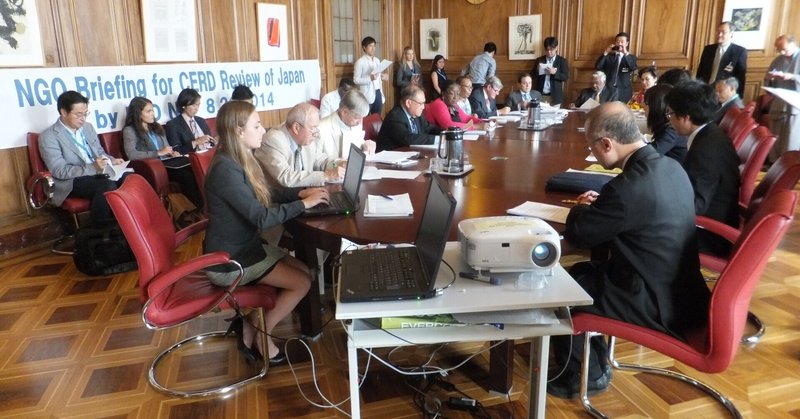
19 Full Ratification of All International Human Rights Treaties
Foreign nationals living in Japan have a duty to pay taxes while they are excluded from various systems because they are not Japanese. They also suffer social discrimination on the grounds of race, ethnicity, and color. Respect for basic human rights is a cornerstone of the Constitution, but it is not a panacea for the protection of the rights of foreign nationals.
Everyone has human rights so that they can live as themselves from the time they are born. The Universal Declaration of Human Rights, which was adopted at the United Nations General Assembly in 1948 shortly after the end of World War II, states that everyone has human rights, regardless of where they are in the world. Based on the principles set forth in the Declaration, the United Nations adopted human rights treaties in succession so that universal human rights standards could take root in each country (Figure 11).
To guarantee the rights of minorities such as indigenous peoples or migrants, whose rights are vulnerable to being violated, it is important to integrate human rights treaties. Once the treaties are ratified, states have an obligation to comply. They must implement legislation and polices in line with the provisions of the treaties.
▶ Ratification of human rights treaties by Japan
The first example of international standards implemented in Japan was the “opening of the door” of public housing to foreign residents at the time of the ratification of the International Covenants (on Civil and Political Rights and on Economic, Social and Cultural Rights) in 1979. People from the former colonies of Japan, such as Korea and Taiwan, who resided in Japan, were unilaterally deprived of their Japanese nationalities when the San Francisco Peace Treaty entered into force in 1952. They became foreign nationals, and were excluded from various systems and procedures. This situation was improved with the removal of the nationality requirement at the time of the ratification of the International Covenants, which included the principle of equality of all individuals within its jurisdiction, which meant non-discrimination between nationals and non-nationals.
Furthermore, in 1981, at the time when Japan was accepting a large number of Indochinese refugees, Japan became a State party to the Refugee Convention. As the Convention requires the “same treatment as nationals” in social welfare, the nationality requirement in the laws pertaining to the national pension and child allowance was removed, and the systems became applicable to foreign nationals. (However, people who were of a certain age or older were left ineligible, and their situation has yet to be resolved.)
With the ratification of the Convention on the Elimination of All Forms of Discrimination against Women in 1985, discrimination against women in the Nationality Act was abolished. Until then, the Nationality Act adopted the principle of paternal jussanguinis, and children of Japanese women who had married foreign nationals were unable to acquire the nationality of their mothers. But with the ratification, the Act was amended so that both parents could confer their nationality to their children.
Legal systems based on international human rights standards were gradually implemented in this way. Behind this development were the efforts by the victims of discrimination and civil society movements aimed at eliminating discrimination.
▶ Remaining issues
The International Convention on the Protection of the Rights of All Migrant Workers and Members of Their Families was adopted by the United Nations in 1990. This Convention is extremely important, as it requires the protection of the rights of migrants including those who are undocumented or in an irregular situation. But Japan, along with other major migrant- receiving countries, has not ratified the Convention.
Also, even when Japan ratifies human rights treaties, it attaches a “reservation” on particular provisions, or an “interpretative declaration” stating that domestic law takes precedence. Article 4 (a) and (b) of the Convention on the Elimination of All Forms of Racial Discrimination requires the prohibition and punishment of propaganda and incitement of racial discrimination. But Japan has attached a “reservation” and has not accepted these paragraphs out of fear that punishment by law may limit the freedom of expression and other freedoms guaranteed under the Constitution of Japan.
In addition, Article 9 of the Convention on the Rights of the Child requires that “a child shall not be separated from his or her parents against their will,” but Japan has attached a declaration stating that the paragraph would “be interpreted not to apply to cases in which a child is separated from his or her parents as a result of deportation in accordance with the immigration law,” giving precedence to the Immigration Control Act over international human rights standards.
Furthermore, what is important for the full ratification of treaties is the acceptance of the individual communication system established under the major human rights treaties. The system allows individuals or groups whose rights were violated, to communicate directly with the treaty bodies for remedies, after exhausting domestic remedies. If a rights violation is found after an examination of the communication, treaty bodies provide State parties with recommendations. However, Japan has not accepted the procedures out of concern that treaty bodies may come up with conclusions that are different from the final verdicts issued by the Supreme Court. It is necessary to withdraw these reservations and interpretative declarations, accept all the provisions of the treaties in good faith, and fully implement them because human rights treaties are the common rules shared by the international community.
この記事が気に入ったらサポートをしてみませんか?
